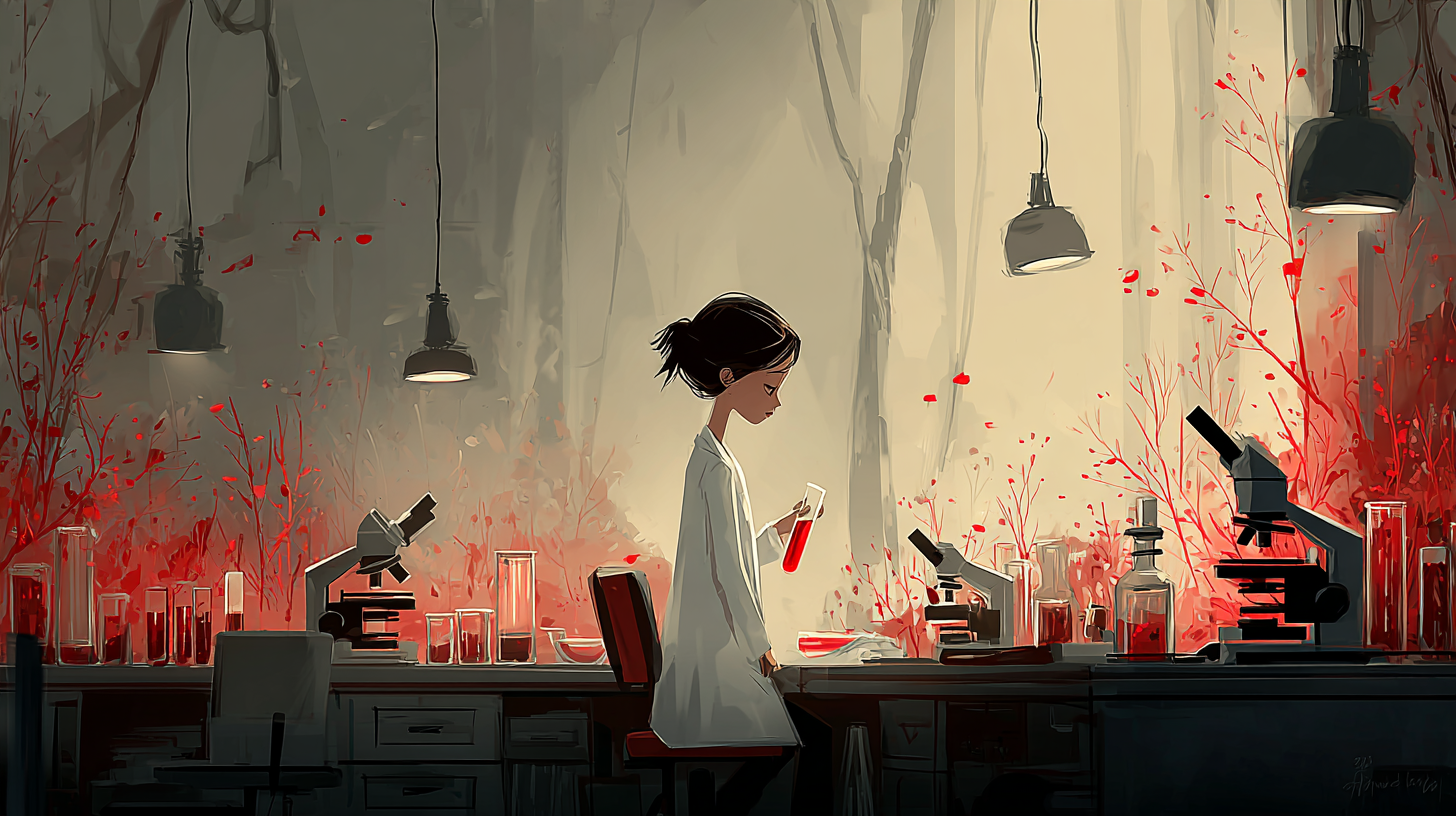A laboratory is a place where people study and test things.
「laboratory」は、研究や実験をする部屋や建物のこと。
以下は英単語 “laboratory” に関するストーリー型学習コンテンツです。まずは大枠の意味を理解して最後の文章で確認しましょう。
主な意味(main meaning)
| 品詞 | 発音(IPA) | 意味 | 英語例文 |
|---|---|---|---|
| 名詞 | /ˈlæbrətɔːri/ または /ləˈbɒrətɔːri/ | 実験や研究を行う場所(実験室、研究所) | She works in a laboratory where scientists test new medicines. |
語源(etymology)
ラテン語 laborare(働く)+ -ory(場所を表す接尾辞)が由来。
核イメージ:「働き、試すための場所」→「実験室、研究所」
類義語(synonyms)
| 類義語 | 意味 | 英語例文 |
|---|---|---|
| lab (口語) | 実験室の略 | She spends most of her day in the lab. |
| research center | 研究センター | The research center is studying new energy sources. |
| testing facility | 試験施設 | This testing facility checks the safety of cars. |
| workshop | 作業場 | The students built a robot in the workshop. |
反義語(antonyms)
| 反義語 | 意味 | 英語例文 |
|---|---|---|
| field | 現場、野外 | The biologist prefers working in the field rather than in a laboratory. |
| office | 事務所 | He moved from the laboratory to the office to manage the team. |
コロケーション(collocations)
| コロケーション | 英語例文 |
|---|---|
| laboratory experiment | They did a laboratory experiment on plant growth. |
| laboratory equipment | The laboratory equipment is very expensive. |
| laboratory research | Laboratory research helps us understand diseases. |
| laboratory technician | The laboratory technician prepared the samples. |
2項表現(binomials)
| 2項表現 | 英語例文 |
|---|---|
| trial and error | We learned through trial and error in the laboratory. |
| research and development | The company invests a lot in research and development. |
英語ストーリー(english story)
The New Medicine Project
Tom had just started working at a large laboratory in the city. The laboratory was famous for its research and development in medicine. Tom felt both nervous and excited on his first day.
His boss, Dr. Smith, showed him the different rooms. “This is where we keep all the laboratory equipment,” Dr. Smith said. “Please be careful. Some of it is very expensive.” Tom nodded and carefully looked at the machines.
Later, Tom joined a small team for a project. They were trying to create a new medicine for seasonal allergies. The work was difficult, and the team often used trial and error to find the best solution. Sometimes their tests failed, but each failure gave them new ideas.
One of Tom’s colleagues, Lisa, was a laboratory technician. She explained how to prepare samples for the laboratory experiment. “If you don’t follow the steps correctly, the results will be wrong,” she said. Tom listened carefully, knowing how important accuracy was.
After a few weeks, the team made some progress. They compared their results with studies from a research center in another country. “Science is about sharing knowledge,” Lisa said. “We learn from others, and they learn from us.”
Tom also noticed the difference between working in a laboratory and working in the field. His friend Mark, a biologist, often collected plants outside. “You stay in the laboratory all day,” Mark said. “I prefer to be in the field.” Tom smiled. “That’s true, but I like the careful tests we can do here.”
Sometimes Tom also helped in the workshop, where students built small models to support their experiments. He enjoyed seeing how ideas turned into real objects.
One afternoon, Dr. Smith came with good news. “Our results are promising,” he said. “The new medicine might really help people. But we need more tests in the testing facility.”
The team cheered. They knew their work was not finished, but they felt proud of their progress. Tom thought back to his first nervous day. Now, he felt confident. Working in a laboratory was not easy, but it was exciting. It was a place where mistakes turned into discoveries, and where hard work could change lives.
和訳
新しい薬のプロジェクト
トムは市内の大きな**laboratory(実験室)で働き始めたばかりだった。その研究所は医薬品のresearch and development(研究開発)**で有名だった。トムは初日、緊張しながらもワクワクしていた。
上司のスミス博士は、さまざまな部屋を案内してくれた。「ここが**laboratory equipment(実験器具)**を置いている場所だ。とても高価なものもあるから気をつけて」と言った。トムはうなずき、機械を注意深く見た。
後にトムはプロジェクトの小さなチームに加わった。彼らは花粉症用の新しい薬を作ろうとしていた。作業は難しく、チームはよく**trial and error(試行錯誤)**を使って最適な方法を探した。時には実験が失敗することもあったが、そのたびに新しいアイデアが生まれた。
同僚のリサは**laboratory technician(実験技師)だった。彼女はlaboratory experiment(実験)**のためのサンプルの準備方法を説明した。「手順を正しく守らないと、結果が間違うの」と言った。トムは注意深く聞き、正確さの重要さを理解した。
数週間後、チームは進展を見せた。彼らは海外の**research center(研究センター)**の研究と結果を比較した。「科学は知識を共有することよ」とリサは言った。「私たちは他人から学び、他人も私たちから学ぶの」
トムはまた、研究室と**field(野外)で働く違いにも気づいた。生物学者の友人マークはよく外で植物を集めていた。「君はいつも研究室にいるね。僕はfield(野外)**の方が好きだよ」とマークは言った。トムは笑い、「そうだね。でもここでは正確な実験ができるのが好きなんだ」と答えた。
時々トムは**workshop(作業場)**でも手伝いをし、学生が小さなモデルを作るのを見た。アイデアが形になるのを見るのは楽しかった。
ある日の午後、スミス博士が良い知らせを持ってきた。「結果は有望だ。新しい薬は本当に人々を助けるかもしれない。ただし、さらに**testing facility(試験施設)**でテストをする必要がある」
チームは歓声を上げた。仕事はまだ終わっていなかったが、彼らは自分たちの進歩を誇りに思った。トムは最初の緊張した日を思い出した。今は自信があった。研究室で働くのは簡単ではなかったが、ワクワクすることだった。そこは失敗が発見に変わり、努力が人々の生活を変える場所だった。
Q&A
Q: 「laboratory」と「lab」はどう違いますか?
A: 意味は同じで「実験室」ですが、「lab」は「laboratory」の短縮形で、口語的・日常的に使われます。例えば友達や学生同士の会話では「lab」と言うことが多いです。
Q: 「laboratory」と「research center」の違いは?
A: 「laboratory」は研究や実験を行う部屋そのものを指します。「research center」は研究機関全体を表し、複数の研究室や設備を含む大規模な場所を指します。
Q: 「laboratory」と「testing facility」の違いは?
A: 「laboratory」は実験や研究を行う一般的な場所です。「testing facility」は主に安全性や性能を試すための施設を意味し、工業製品や薬などのテストに特化しています。
Q: 「laboratory」と「workshop」の違いは?
A: 「laboratory」は科学実験や研究を行う場です。「workshop」は道具を使ってものを作ったり、工作や修理をしたりする作業場を指します。科学よりも実践的な「作業」が中心です。
Q: 「laboratory experiment」と「laboratory research」はどう違いますか?
A: 「laboratory experiment」は特定の実験を意味します。「laboratory research」は広く研究活動全般を指し、実験だけでなくデータ分析や理論的な調査も含まれます。
Q: 「laboratory equipment」と「laboratory technician」の違いは?
A: 「laboratory equipment」は研究や実験に使う器具や装置を指します。一方「laboratory technician」は研究を支える技術者や専門スタッフを指します。



コメント